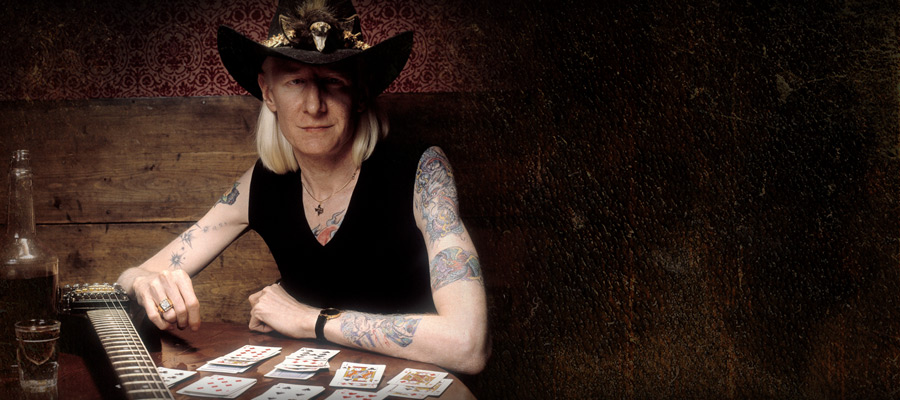Johnny Winter, Texas Blues Icon, Dead at 70

Texas blues legend Johnny Winter died Wednesday, July 16. He was 70. The cause of death is unknown at this time.
This morning, the guitarist's Facebook page offered the following news item, which also was released by his publicist overnight:
"Texas blues icon Johnny Winter has passed away on July 16, 2014, in his hotel room in Zurich, Switzerland. His wife, family and bandmates are all saddened by the loss of their loved one and one of the world's finest guitarists. An official statement with more details shall be issued at the appropriate time."
"As the great blues historian Robert Palmer once bluntly stated, 'Texas's blues pedigree is unsurpassed," wrote Guitar World editor-in-chief Brad Tolinski in the liner notes for Winter's 2013 career-retrospective box set Johnny Winter: True To The Blues. "But of all of these bright lights, perhaps the most electrifying, exotic and resilient Texas export is a snowy white guitarist from Beaumont, whose truth-is-stranger-than-fiction given name is Winter.
"For well over five decades, John Dawson 'Johnny' Winter III has produced and played on some of the most exciting blues and rock recordings in the history of both genres. His absolute command of traditional music has earned him the respect of serious musicologists, while his tremendous agility, wicked speed and full-tilt aggression on the electric guitar and acoustic bottleneck has won over several generations of younger rock players looking to cop some the fastest and hottest licks ever committed to tape."
The Blues magazine editor Ed Mitchell added, "It's no secret Johnny has battled with ill health for many years — but he seemed to transcend that struggle when he played live. No one's slide tone was as sweet, searing, stinging or fiery. Johnny Winter blazing away on a Gibson Firebird is an iconic blues image. He was the greatest slide blues guitarist that ever lived. We'll always have him to thank for pulling Muddy Waters out of his funk in the Seventies and helping him record some of his greatest work: 'Hard Again', 'I'm Ready' and 'King Bee'. All essential."
Johnny Winter had been playing electric blues since the Sixties, and his enthusiasm for it only grew with time.
All the latest guitar news, interviews, lessons, reviews, deals and more, direct to your inbox!
"There's never been a point in my life where I was even close to getting tired of playing blues," Winter told Guitar World in 2012 while relaxing in his dressing room at B.B. King's Blues Club in New York City, on tour as usual. "The truth is, I love playing the blues, now more than I ever have before."
Johnny, the older brother of Edgar Winter, has always been one of the most respected blues guitarists and championed and aided the careers of older idols, including Muddy Waters and John Lee Hooker.
Winter was born February 23, 1944, in Beaumont, Texas. His recording career began when he was 15; his band, Johnny and the Jammers released "School Day Blues" on a Houston record label. During this same period, he was able to savor performances by blues greats Muddy Waters, B.B. King and Bobby "Blue" Bland. In 1967, Winter recorded a single with the Traits, "Tramp" backed with "Parchman Farm." In 1968, he released his first album, The Progressive Blues Experiment, on Austin's Sonobeat Records.
His breakthrough came later that year when Rolling Stone featured him in a piece on the Texas music scene, which prompted a bidding war among labels that Columbia eventually won.
Winter's first Columbia album, Johnny Winter, was recorded and released in 1969. The album (which featured future Stevie Ray Vaughan and Double Trouble bassist Tommy Shannon) featured several of what would become Winter's signature songs, including "Dallas," John Lee "Sonny Boy" Williamson's "Good Morning Little School Girl" and B.B. King's "Be Careful With a Fool."
Winter was set to release a new studio album, Step Back, September 2 via Megaforce Records. The album, the follow-up to 2011's Roots, will feature a host of special guests, including Eric Clapton, Billy Gibbons, Joe Perry, Dr. John, Leslie West, Brian Setzer and Joe Bonnamassa.
Since 1980, Guitar World has been the ultimate resource for guitarists. Whether you want to learn the techniques employed by your guitar heroes, read about their latest projects or simply need to know which guitar is the right one to buy, Guitar World is the place to look.

